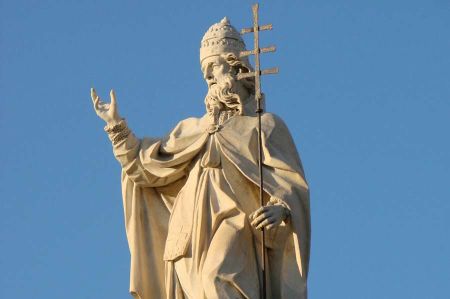New Year's Eve - the next turn of the year is coming!
- Written by Portal Editor
And another year has almost passed, a new year has begun. Many events, both positive and negative, happened in the past year, so there were many annual reviews of past events in the media,
which should motivate everyone to at least draw a short summary of their own in order to learn lessons for the future. perhaps to change, adapt and react to things in your own life. It is not for nothing that the wishes "Happy New Year" are made or that one wishes oneself with the help of various, for the sake of simplicity we call them "oracles" such as the lead casting, that one's own wishes will come true.
But why on this day, at this New Year's event? What makes this date so important? Of course, a New Year's Eve celebration is something great, plus the banging of the firecrackers and the rockets in the night sky. Where does all this come from?
Celebrations at the end of the year were already celebrated by the Romans - the first calendars?
 Yes, that's right, the Romans already had a festival at the end of the year, but the calendar division that we now have almost worldwide, with the end of the year on December 31st and the beginning of the new year on January 1st, did not initially apply to them. As early as 713 BC. according to tradition, the Roman calendar was reformed by Numa Pompilius, the legendary second of the seven kings of Rome. However, this has not been scientifically proven.
Yes, that's right, the Romans already had a festival at the end of the year, but the calendar division that we now have almost worldwide, with the end of the year on December 31st and the beginning of the new year on January 1st, did not initially apply to them. As early as 713 BC. according to tradition, the Roman calendar was reformed by Numa Pompilius, the legendary second of the seven kings of Rome. However, this has not been scientifically proven.
The origin of numerous calendar forms has not yet been clarified with certainty, but the shape, style and length of the intercalary months clearly show Etruscan-Latin characteristics, although the Etruscan influence was still dominant in the early period. The oldest evidence of a calendar, the Fasti Antiates maiores, which is documented just dates back to 173 BC.. For the Romans, the new year began on March 1st until the beginning of the year was postponed to January 1st in 153 BC. Why this shift was made is still academically controversial discussed, but it is said that January 1st was always the day the consul took office. The years were accordingly named after the terms of office of these consuls. This meant that the counting months (September, equivalent to the seventh month; October, the eighth; November, the ninth; December, the tenth) also lost their corresponding positions.
New Year's Eve just a name day?
 It is also interesting that in parts of the Christian world there was now a rule that December 24th was the last day of the year. It was just with the Gregorian calendar reform of 1582 that the last day of the year was moved from December 24th to December 31st, the anniversary of the death of the "Pope", or rather Bishop Silvester I of Rome on December 31st, 335. Silvester I is still known today as Saint is venerated and is the first holy pope who did not suffer martyrdom and is celebrated by the Roman Catholic Church on the anniversary of his death, December 31st. This is the origin of the name New Year's Eve for December 31st. Since the year 813, the liturgical calendar has also listed the day as the name day "New Year's Eve I". New Year's Eve is originally a saint's day of remembrance and not a church holiday at the turn of the year. Until New Year's Day was established in 1691 by Pope Innocent XII. On January 1st, January 6th was still considered the start of the year in many parts of Europe.
It is also interesting that in parts of the Christian world there was now a rule that December 24th was the last day of the year. It was just with the Gregorian calendar reform of 1582 that the last day of the year was moved from December 24th to December 31st, the anniversary of the death of the "Pope", or rather Bishop Silvester I of Rome on December 31st, 335. Silvester I is still known today as Saint is venerated and is the first holy pope who did not suffer martyrdom and is celebrated by the Roman Catholic Church on the anniversary of his death, December 31st. This is the origin of the name New Year's Eve for December 31st. Since the year 813, the liturgical calendar has also listed the day as the name day "New Year's Eve I". New Year's Eve is originally a saint's day of remembrance and not a church holiday at the turn of the year. Until New Year's Day was established in 1691 by Pope Innocent XII. On January 1st, January 6th was still considered the start of the year in many parts of Europe.
However, New Year's Eve is now also celebrated in church in many places as the end of the year, because as J. Smend so aptly said: "It is irrevocable that the beginning and end of the civil year also make a greater impression on the church community than those of the church year." The church year does not end on New Year's Eve, but before Vespers on the eve of the 1st Sunday in Advent, and the Christmas festival circle only ends on Epiphany (January 6th, "Apparition of the Lord" in the Protestant Church) or on the feast of Jesus' baptism the following day Sunday (in the Catholic Church).
All of this was rather minor for the ancient Germanic peoples, but they also had their fire festivals at the end of the year. Which date was the “correct” one according to the calendar is rather irrelevant. In many regions of Germany, people still don't speak of New Year's Eve, but rather simply "Old Year's Eve" as a counterpart to the following New Year's Day.
How common is New Year's Eve in Europe?
 New Year's Eve services in the evening or at night provide space for the theme of transience and new beginnings, wishes, thanks and requests; they are often musical or meditative. New Year's Eve is often spent in the company of friends or relatives. At midnight the celebrations mainly include fireworks, firecrackers and ringing of bells and toasts with champagne. In the original sense, the fireworks are intended to drive away evil spirits and also express anticipation for the new year. In almost all cultures around the world, New Year's Day is also associated with a New Year's celebration and the associated customs, but due to the different time calculations and therefore also the calendar, the start of the year occurs at different times.
New Year's Eve services in the evening or at night provide space for the theme of transience and new beginnings, wishes, thanks and requests; they are often musical or meditative. New Year's Eve is often spent in the company of friends or relatives. At midnight the celebrations mainly include fireworks, firecrackers and ringing of bells and toasts with champagne. In the original sense, the fireworks are intended to drive away evil spirits and also express anticipation for the new year. In almost all cultures around the world, New Year's Day is also associated with a New Year's celebration and the associated customs, but due to the different time calculations and therefore also the calendar, the start of the year occurs at different times.
Whether with or without New Year's Eve celebrations or Old Year's Day, a happy and happy New Year to all of you.
Please read as well:
